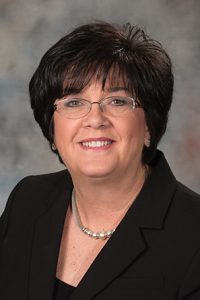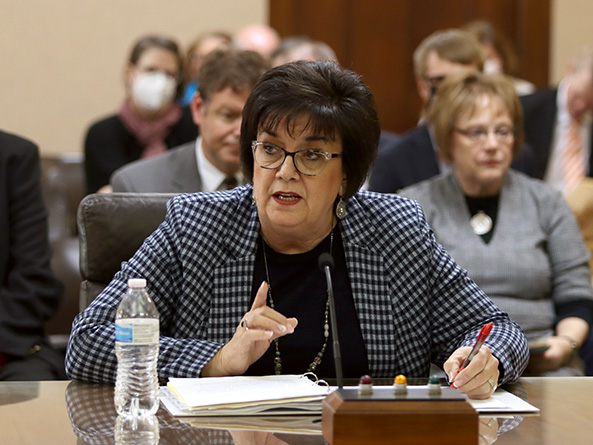Proposal to ban obscene digital resources considered
The Judiciary Committee heard testimony Feb. 9 on a bill aimed at prohibiting K-12 students from accessing digital content that is deemed obscene.

LB1213, as introduced by Thurston Sen. Joni Albrecht, would prohibit a school, school district or the Nebraska Library Commission from providing K-12 students with online or digital resources considered to be obscene or harmful as defined in state law. In addition, those entities would be required to implement technology protections to filter and block inappropriate content from minors and establish and verify an online account for every K-12 student.
Under the bill as introduced, a minor, parent or guardian could bring a civil action against any vendor, person or entity that provides online resources deemed obscene or harmful and could recover damages of up to $10,000 per violation.
The state Department of Education and the library commission would be required to submit an annual report to the governor and the Legislature’s Education Committee on any issues related to provider compliance by December 1 of each year.
Albrecht brought an amendment to the hearing that would shift certain provisions of the bill to educational research database providers instead of schools, school districts and the NLC.
Many people have expressed concern to EBSCO and Gale, two educational database providers, over the inappropriate content that student users encounter, Albrecht said. In response, database providers may remove a specific link, she said, but do not remove the content from access by students in other schools.
“We owe it to the Nebraska parents, teachers, librarians [and] schools to stop K-12 [students] from being exposed to obscene content in the name of education paid for by Nebraska tax dollars,” Albrecht said. “Together, we can hold education research database providers accountable for obscene content included in the databases that they’re currently providing for our K-12 children.”
Under the amendment, responsibility for filters, blocking and account establishment would move to educational research database providers. Database providers also would be required to furnish a child’s account credentials to the parent or legal guardian, allowing access to all materials accessible to the student.
Additionally, the amendment would give schools, school districts and the NLC authority to withhold payment or terminate a contract with a database provider for not removing obscene content. A student, parent or guardian could bring a civil action against a vendor or provider of an educational research database to recover damages sustained by the child, parent or guardian of up to $10,000 per violation.
In support of the amended version of LB1213 was Kent Kingston, executive director of technology for Millard Public Schools.
“Educational research database providers should be providing age-appropriate materials free of harmful content,” Kingston said. “The recommended amendment to LB1213 … holds those providers accountable while not disabling school districts’ use of technology.”
Brian Tegtmeier, technology director for North Platte Public Schools, also spoke in support. Educational database providers have been asked to restrict obscene content but have been unwilling to do so, he said.
“If an education database provider hasn’t developed their resources with age-appropriate content protection for our students, then they have no business marketing and selling these resources to our public schools,” Tegtmeier said. “LB1213 will require these companies to remove links to sites that are deemed obscene to minors.”
In opposition to the bill was Emily Nimsakont, who spoke on behalf of the Nebraska Library Association and the Nebraska School Librarians Association. While there are concerns regarding students accessing harmful material, she said, the bill largely is redundant due to measures already in place.
“The Children’s Internet Protection Act requires all Nebraska schools and public libraries who receive E-rate funds to have filters in place to prevent children from accessing harmful material,” Nimsakont said. “More than half of the public libraries in our state filter according to these standards and all public schools and some private schools filter according to … these standards.”
Rod Wagner, Nebraska Library Commission director, spoke in opposition to the original bill and the amendment. He expressed concern over the library commission’s ability to fulfill certain “absolutes” proposed in LB1213 relating to student accounts, electronic devices and references to academic libraries.
The committee took no immediate action on LB1213 or the proposed amendment.


